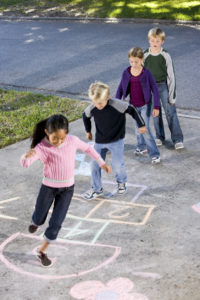As I reflect on the seductive appeal of Olympic sports, I’m drawn to the notion that sport is play. It may be a livelihood and an obsession for the athletes themselves, but for spectators, a sport is still a game. But what makes an activity playful?

In his seminal book, Homo Ludens, Johan Huizinga identifies key features of play as the following:
* All play is a voluntary activity; it is free; it is never imposed as a duty or a practical task.
* Play is not ordinary or real life – it is a “stepping out of ‘real’ life into a temporary sphere of activity with a disposition all its own.”
* Play is distinct from ordinary life in location and duration – it is played out “within certain limits of time and place.”
* Play creates order – “into an imperfect world and into the confusion of life it brings a temporary but limited perfection.”
* Playing creates community – “a feeling of being ‘apart together’ in an exceptional situation, of sharing something important.” Consequently, play “retains its magic beyond the duration of the individual game.”
Finally, play has a tendency to be beautiful. More about beauty and grace in the next blog.
